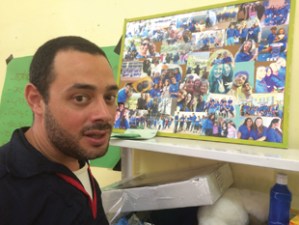 Zohar Avigdori
Zohar AvigdoriJaffa, Israel | Zohar Avigdori walked into a typically disheveled staff room of an atypical summer camp in Israel and sniffed appreciatively. “Always the smell of chocolate spread and sweat,” the 33-year-old remarked nostalgically. “Summer in the youth movement.”
Teenage counselors were busy getting ready for the 100 Arab and Jewish kids who would soon arrive for a four-day shared existence camp.Its purpose: To engage children from the heavily segregated Jaffa area, south of Tel Aviv, in fun activities that would build friendships.
The camp is run by Dror Israel, a modern-day, idealistic kibbutz movement devoted to improving Israeli society through education. The program has some 1,200 staff members who live in 16 urban kibbutzes throughout Israel; at nearby facilities, they run schools, camps and other programs that engage Arabs, Jews, new immigrants, at-risk youth and others.
“They basically use Jewish education as a lever for societal change,” said Rabbi James Brandt, CEO of the Jewish Federation of the East Bay, which this year gave $65,000 to help fund a Dror Israel kibbutz — one located in Akko on Israel’s north coast.
“In a time in Israel when traditional kibbutzim are in such a sharp decline, they’ve developed a new model for the kibbutz where the product of the kibbutz is Jewish education and social change,” Brandt added. “The goal of the kibbutz is to improve Israeli society.” Mural at a Dror Israel camp in Jaffa photos/drew himmelstein
Mural at a Dror Israel camp in Jaffa photos/drew himmelsteinIn addition to giving money to Dror Israel over the past four years, the East Bay federation has engaged in exchanges with the program — with East Bay community members visiting the kibbutz in Akko and Dror Israel members traveling to the East Bay.
“I find meaning in trying to build a better Israeli society,” said Jonathan Kershenbaum, 23, activity coordinator of the Dror Israel camp in Jaffa. “We believe the key to integration is friendship, meeting, relationships, cooperating. The point of our activities is to get the kids to meet, to interact.”
Dror Israel grew out of the youth movement HaNoar HaOved VeHaLomed, which means “the working and studying youth.”
That’s the movement Avigdori grew up in, participating in after-school activities akin to the Cub Scouts and Boy Scouts and latching onto the movement’s labor activism. The seed was planted, and in the army, he served alongside other youth movement members, then spent 10 months doing national service as an educator.
Now he lives on a Dror Israel kibbutz in Eshbal, in Israel’s north, where he and other members pool their income and make collective decisions about how to run the community. He works in fundraising and helps facilitate Dror Israel’s relationship with the East Bay federation.He also works on Dror Israel’s Yitzhak Rabin memorial and dialogue project, and will be a speaker and workshop leader at a Lehrhaus Judaica symposium in November marking the 20th anniversary of the former Israeli prime minister’s assassination. He was in the East Bay last year, working as a docent when the Dror Israel project “About-Face: Yitzhak Rabin, His Life and Legacy” was on display at three local synagogues and Berkeley Hillel.
Avigdori said Dror Israel is a way to realize the Zionist dream in the 21st century. Though earlier generations of idealistic Israelis moved to rural kibbutzes to farm the land, Avigdori said things are different nowadays.
“Growing up in the late ’90s in a suburb of Tel Aviv, it would seem unreasonable that the way to fulfill myself as an Israeli Zionist would be to move to the Negev and grow capsicum,” he said.
Instead, he said, what felt relevant was to devote his life to education. He invokes the idealism of Theodor Herzl’s Zionist vision, which he understands as “the fulfillment of the Jewish decree to do tikkun olam and to be a light among the nations.”
Teaching young people, he said, is one of the best ways to enact social change and attempt to heal the divisions in Israeli society.
“I believe education is the most radical way to change reality,” he said. “Influencing people in a dialogue, working from the grassroots up. If you’re doing actual education, you’re able to ask people questions instead of giving them answers.”